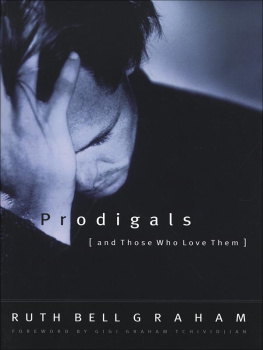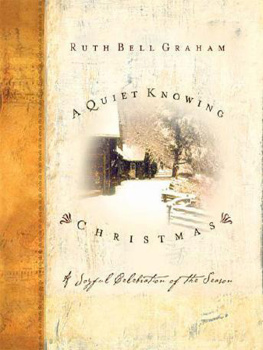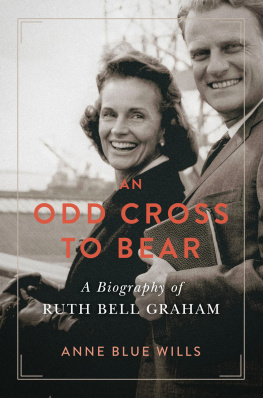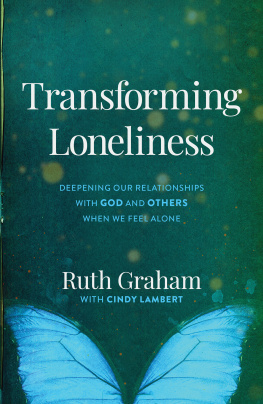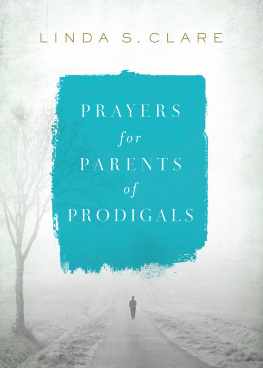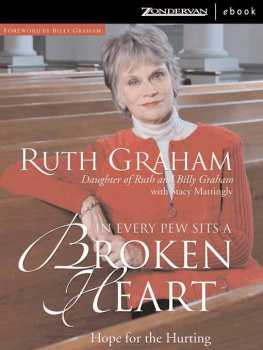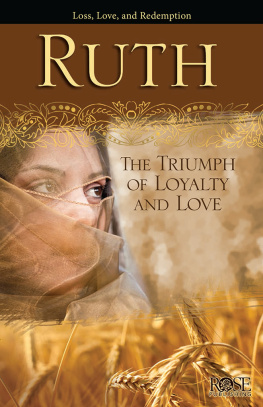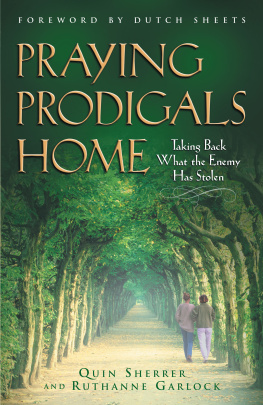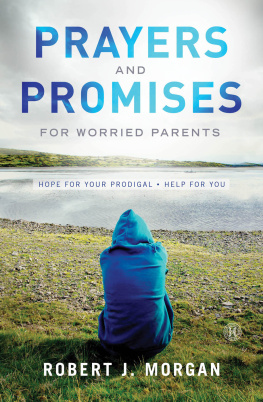
Prodigals
AND THOSE WHO LOVE THEM
Prodigals
AND THOSE WHO LOVE THEM
Words of Encouragement for Those Who Wait
Ruth Bell Graham

1991, 1999 by Ruth Bell Graham
Published by Baker Books
a division of Baker Publishing Group
P.O. Box 6287, Grand Rapids, MI 49516-6287
www.bakerbooks.com
New paperback edition published 2008
ISBN 978-0-8010-7155-3
All rights reserved. No part of this publication may be reproduced, stored in a retrieval system, or transmitted in any form or by any meansfor example, electronic, photocopy, recordingwithout the prior written permission of the publisher. The only exception is brief quotations in printed reviews.
The Library of Congress has cataloged the previous edition as follows:
Graham, Ruth Bell.
Prodigals and those who love them / Ruth Bell Graham.
p. cm.
Includes bibliographical references.
ISBN 978-0-8010-5897-4 (pbk.)
1. Christian life. 2. FamilyReligious life. 3. Prodigal son (parable) I. Title.
[BV4501.2.G7246 1999]
248.4dc21 99-14366
Unless otherwise indicated, Scripture is from the King James Version of the Bible.
Scripture marked AMPLIFIED is from the Amplified New Testament. Copyright 1954, 1958, 1987 by the Lockman Foundation. Used by permission.
Scripture marked NIV is from the HOLY BIBLE, NEW INTERNATIONAL VERSION. NIV. Copyright 1973, 1978, 1984 by International Bible Society. Used by permission of Zondervan. All rights reserved.
Scripture marked PHILLIPS is from The New Testament in Modern English, copyright 1958, 1960, 1972, by J. B. Phillips.
The Prodigal by F. W. Boreham is reprinted by permission of the publisher.
Confirm, O Lord, That Word of Thine is from Thou Givest... They Gather by Amy Carmichael, copyright 1958 Dohnavur Fellowship (Fort Washington, Penn. Christian Literature Crusade). Used by permission.
Love Knows What to Do is from Toward Jerusalem by Amy Carmichael, copyright 1936 Dohnavur Fellowship (Fort Washington, Penn. Christian Literature Crusade; London: S.P.C.K.). Used by permission.
Give Me to Hold Me Firmly to My Trust is from Thoughthe Mountains Shake by Amy Carmichael, copyright 1943 Dohnavur Fellowship. Used by permission.

Home is that place from which,
when a man has departed,
he is a wanderer until he returns.
Sir William Blackstone
The Prodigal Son
And [ Jesus] said, A certain man had two sons: And the younger of them said to his father, Father, give me the portion of goods that falleth to me. And he divided unto them his living.
And not many days after the younger son gathered all together, and took his journey into a far country, and there wasted his substance with riotous living. And when he had spent all, there arose a mighty famine in that land; and he began to be in want. And he went and joined himself to a citizen of that country; and he sent him into his fields to feed swine. And he would fain have filled his belly with the husks that the swine did eat: and no man gave unto him.
And when he came to himself, he said, How many hired servants of my fathers have bread enough and to spare, and I perish with hunger! I will arise and go to my father, and will say unto him, Father, I have sinned against heaven, and before thee, and am no more worthy to be called thy son: make me as one of thy hired servants.
And he arose, and came to his father. But when he was yet a great way off, his father saw him, and had compassion, and ran, and fell on his neck, and kissed him.
And the son said unto him, Father, I have sinned against heaven, and in thy sight, and am no more worthy to be called thy son.
But the father said to his servants, Bring forth the best robe, and put it on him; and put a ring on his hand, and shoes on his feet: and bring hither the fatted calf, and kill it; and let us eat, and be merry: For this my son was dead, and is alive again; he was lost, and is found. And they began to be merry.
Now his elder son was in the field: and as he came and drew nigh to the house, he heard music and dancing. And he called one of the servants, and asked what these things meant.
And he said unto him, Thy brother is come; and thy father hath killed the fatted calf, because he hath received him safe and sound.
And he was angry, and would not go in: therefore came his father out, and entreated him.
And he answering said to his father, Lo, these many years do I serve thee, neither trangressed I at any time thy commandment: and yet thou never gavest me a kid, that I might make merry with my friends: but as soon as this thy son was come, which hath devoured thy living with harlots, thou hast killed for him the fatted calf.
And he said unto him, Son, thou art ever with me, and all that I have is thine. It was meet [fitting] that we should make merry, and be glad: for this thy brother was dead, and is alive again; and was lost, and is found.
Luke 15:1132
Contents
by Ruth Bell Graham
by Ruth Bell Graham
by Ian Maclaren
by F. W. Boreham
by Gigi Tchividjian
Foreword
Understanding Prodigals
It was a warm, balmy, North Florida evening. The waves gently lapped the white sand beach outside of our hotel room, and the palm fronds rustled against the window as we dressed for dinner.
Mother was to be interviewed at an event honoring a prestigious medical institution. During the interview she answered questions about her childhood in China, her high school years in North Korea, and then her marriage to and her life with my daddy, Billy Graham. She went on to discuss her years as a mother, her joys as well as her difficulties. Those difficulties included the many occasions of making tough decisions alone, because Daddy was away preaching. She also shared about the trying years when she had to deal with her prodigals.
After dinner, many came up to speak and to thank her for her honest, open sharing. I noticed one distinguished, well-dressed woman who hung back, waiting for a chance to speak. Tension was evident and she struggled to hold back the tears. When the crowd cleared, she approached mother timidly, hesitantly.
My son died of an overdose of drugs, she said with difficulty. Do you think I will see him again in heaven?
Mother, although not knowing any of the details, saw before her a mother with a very heavy heart. She answered, If you heard a timid knock on your door one day, and you answered the knock only to find your child standing there, bruised, wounded, bleeding, dirty, and tattered, what would you do? Slam the door in his face? Or would you throw open the door and welcome him into your arms?
Suddenly, this mothers face registered relief. I saw the load lift from her shoulders as the tears flowed down her cheeks, because she knew she was hearing from a mother who knew what it was like to have a prodigal. They hugged each other, and the woman turned and disappeared into the crowd.
Mother knew about prodigals, and this book reflects her search for Gods comfort during those times in her life when her prodigals were running away from her love and care and only God could look out for them.
These stories and readings have been a great source of help to meher daughterwho has also had to deal with a prodigal.
Next page
